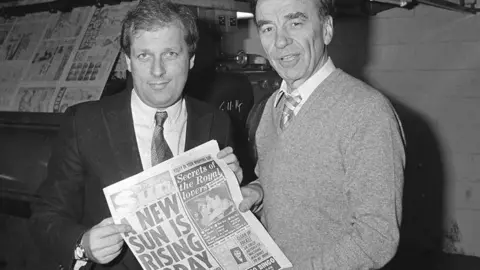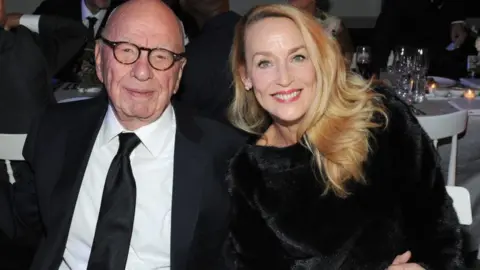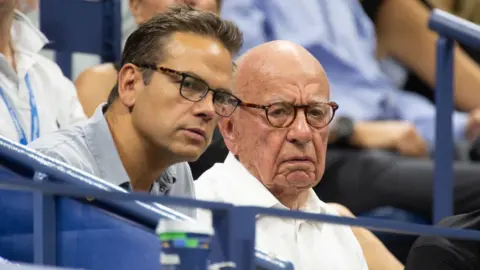Murdoch: What next for the media mogul after Sky deal?
 Getty Images
Getty ImagesComcast's victory in the long battle to win control of Sky, the satellite broadcaster founded by Rupert Murdoch in the 1980s, is the latest milestone in the media tycoon's colourful career that spans six decades.
It comes less than a year after the Australian sold the entertainment assets of 21st Century Fox, including Fox's film and television studios, to Walt Disney for $52bn.
Yet anyone thinking these deals mark the end of an era - or even the end - for Mr Murdoch would be sorely underestimating him.
His passion has always been news - more specifically newspapers - which laid the foundations for his empire and also gave it its name, News Corp. That company is still controlled by Mr Murdoch and contains his print media interests.
The 87-year-old was born into a family that owned several papers in Australia and was left an afternoon title in Adelaide called The News by his father when he died.
After reviving an ailing afternoon paper in Sydney, Mr Murdoch did the same trick the UK - first with the News of the World, before swooping on the Sun in 1969.
Against the odds, the "red-top" tabloid had became the UK's biggest-selling newspaper by 1980, overtaking the Daily Mirror, after adopting controversial features such as putting a topless model on page three.
 PA
PAThe paper once sold close to four million copies a day - a number that has fallen to just over 1.4 million copies, but still has the highest daily sale according to ABC. The Daily Mail, its closest rival, sells 1.27 million copies a day.
Despite owning the Times - once known as the UK's "paper of record" - since 1981, the Sun has always been the title that Mr Murdoch cares about the most.
While the Sky deal means the tycoon no longer owns a TV news outlet in the UK, his two daily papers remain a crucial part of the media landscape in a country where the broadcast news agenda is still shaped by print.
As Prof Stewart Purvis, a journalism academic at City, University of London, points out, Mr Murdoch still controls the most popular and one of the most respected newspapers in Britain in the Sun and the Times.
He has also retained Fox News - the high-ratings US news channel beloved of conservatives and the current occupant of the White House - as well as Sky News Australia.
News Corp dominates the newspaper market down under, owning the biggest-selling dailies in Sydney and Melbourne as well as the sole national title, The Australian, along with the Wall Street Journal and the New York Post in the US.
 Getty Images
Getty ImagesOver the years the Sun has often boasted about its ability to make or break governments. In contrast, Prof Purvis says Mr Murdoch's pay TV business has been very successful and wealth-creating, but did not bring much political influence.
Nevertheless, ministers have tried not to upset either Sky or Mr Murdoch - something he says is unlikely to change following the deal for the satellite broadcaster: "Governments will still be wary of [Murdoch's] power in the media."
Indeed, the recent downfall of Malcolm Turnbull as Australian prime minister was partly attributed to a campaign waged by Murdoch newspapers against his energy policy.
Given the continued slide in newspaper advertising revenue, the company's UK division (cunningly called News UK) is looking to diversify its revenue streams. One example is its recent purchase of the Virgin Radio brand and poaching Chris Evans from Radio 2 to present the station's breakfast show.
 Getty Images
Getty ImagesThe company also owns Talk Radio and has been flashing its chequebook to attract high-profile presenters such as Matthew Wright to the speech station.
Radio is a "business that could grow" for News UK, Prof Purvis adds.
More consolidation in the media sector is likely as big media companies seek scale in a world increasingly dominated by the likes of Amazon and Google.
Richard Greenfield, an analyst at research firm BTIG, likens the trend to the opening scene in the documentary March of the Penguins: "The penguins huddle to survive winter. With Disney/Fox and Comcast/Sky, it's penguins huddling - winter is still coming."
